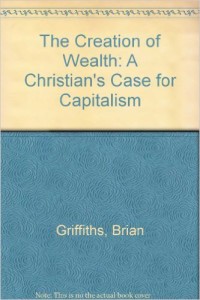 One of the books that most shaped my work on Discipling the Nations was The Creation of Wealth by Brian Griffiths. Griffiths has been Dean of the City University Business School in London, a director of the Bank of England.
One of the books that most shaped my work on Discipling the Nations was The Creation of Wealth by Brian Griffiths. Griffiths has been Dean of the City University Business School in London, a director of the Bank of England.
In the modern materialistic world wealth is seen as a resource in the ground. Socialist and Communist models for fighting poverty tend to be statist politically and redistributionist economically. This is so because the underlying assumption of the materialist paradigm are that there is no God. Nature is all there is. Human beings are mouths to be fed and resources are limited and found in the ground. If people are poor, it is because others are rich. The solution is the redistribution of scarce resources either through taxation or the overthrow of government. As we have witnessed at the end of the twentieth century, this model has failed. Communism has collapsed. Yet in the West, many still function from an atheistic-materialistic paradigm and seek to impose statist redistributionist solutions to the problem of poverty.
But another paradigm is needed, another metaphysical story, to solve the problem of poverty. The Bible provides the answer to this dilemma. The Bible reveals, as does creation, that God exists. It reveals that human beings are more than mouths to be fed, they are human beings made in the image of God. Creation is filled with potential waiting to be discovered –It is the glory of God to conceal a matter; to search out a matter is the glory of kings (Proverbs 25:2), and resources to be uncovered and wealth to be created. Human beings have been equipped with minds to reason and hearts to imagine. Wealth is not in the ground. It is the product of human imagination.
It is important that we understand the theological dimension of human wealth. As an example, Brian Griffiths shows the relationship between God as trinity and the implications of this reality for social, economic and political life. As I have said elsewhere, the spiritual impacts the physical through culture; and culture is upstream from politics and economics. Griffiths writes:
… before time there was plurality of persons in the Godhead. God was not alone. He was not some solitary figure, unable to communicate, for whom love was a meaningless idea. The Trinity was a community, a fellowship. The persons of the Trinity related to each other and always have done so.
This has important implications. It suggests that the idea of community is crucial to the life of society. Any view of community which analyses behaviour as if the individual were some form of automaton is deficient because it fails to capture the importance of relationships. We were not created to live as Crusoe-like figures. As well as this, there is also the relationship which the Trinity expresses between the one and the many, unity and diversity. In the Trinity the one God does not take precedence over the many persons, neither do the many take priority over the One.
When in religion the One is given preference, as in Islam, the consequence has been a form of totalitarian state which attempts to discern the will of Allah. When the many are given priority the result is anarchy. But the tension is one which extends to economic philosophy. Fascism and Marxism are both an attempt to emphasize the one to the exclusion of the many and to find salvation in economic terms through the state.
Libertarianism is an attempt to emphasize the many at the expense of the One and is a prescription not just for laissez faire but also for anarchy. The relevance of the Trinity is to emphasize both the individual and the state, as well as a large variety of mediating institutions which form the basis of a pluralist society. As far as economic life is concerned these include corporations, partnerships, trade unions, professional associations, committees concerned with setting standards, and so on.
For more on this subject, please read The Theological Dimension from Griffiths’s book.
– Darrow Miller






3 Comments
Jon Davis Jr.
May 28, 2012 - 8:00 pmI’ll have to take a look at that book. It looks very interesting, although it sounds like it would give a greater role to the State than I would. But I won’t judge it until I’ve read it. 🙂
I’m printing off a copy of that chapter right now. I might order the book on Amazon. I’m not sure yet.
Blessings to you!
Financialpolicy
June 4, 2012 - 6:10 amOne of the first ways of beginning that process would be to repeal all of the anti-opportunity legislation that has been foisted on the American people in the past few years.
Fiscal Policy Issues